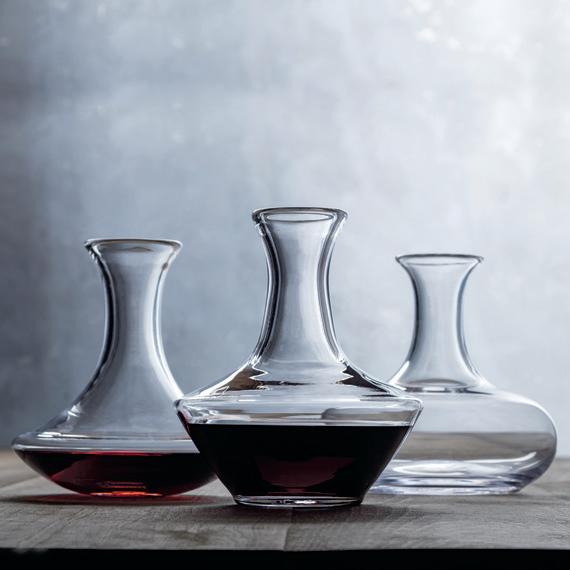Do You Really Need a Wine Decanter?

Even if you're not obsessive about wine, there's something to be said for the tradition of decanting as a pre-dinner custom and an eye-catching way to announce that good wine (and, presumably, good food) are on the way. But are decanters, like those from Simon Pearce shown above, necessary? And if not, when should wine be decanted? We talked to two experts to find out.
Related: What You Need to Know About Natural Wine
Why Is Decanting Wine Less Popular?
As a practice, it feels like decanting is on the decline. Jim Laughren, a Certified Wine Educator and the author of 50 Ways to Love Wine More, agrees. "The increased democratization of wine over the last number of years has led to less focus on formerly sacrosanct rituals." And while there certainly are restaurants that maintain an old-school approach to both service and wine, fine dining today is just as likely to feature a six- or seven-page current-vintage wine list, instead of a 100-page door-stopper featuring older vintages, with far fewer wines that benefit from decanting. Plus, decanters cost money; it's an added expense in this day of razor-thin restaurant margins to set a decanter on every table that orders wine, rather than the bottle alone.
What About Decanting Wine at Home?
There are times (two of them, actually) when decanting is a good idea. The first is with young, tannic wines that "need to breathe," says Laughren. Think: just-released Bordeaux, especially those of the Left Bank that are dominated by cabernet sauvignon, young Brunellos di Montelcino, Barolos and Barbarescos, Douros, and syrahs. No need to be meticulous; the goal is to oxygenate the wine, so splashing and pouring rapidly into the decanter gets the job done nicely. Bertus van Zyl, winemaker at Tank Garage Winery, likes to decant young wines to allow the texture and flavors to reach their full potential. "Instead of aging your wine for 10 years, you can decant it and leave it to aerate for a couple of hours—and it will be ready to go," he says.
The second time you should decant is with older wines that have sediment deposits in the bottle. Since wine is aged on its side, a careful peek at the bottom side of a bottle may reveal a dark deposit. If there is a deposit, handle the bottle gently, Laughren advises, and decant it slowly, preferably over a light source that reveals what's happening inside the bottle, just until the sediment is about to be poured into the decanter then stop. (Sediment isn't dangerous to drink, but it's unpleasant, sort of like getting a mouthful of coffee grounds.)
Want to skip decanting entirely? Van Zyl says if you prefer big, bold wines with lots of texture, you don't necessarily need a decanter. Most domestic pinot noirs don't need to be decanted and cold, crisp whites and rosés definitely don't. Laughren also notes that some people like to give big, bold Chardonnays a turn in the decanter but, like so much in the wine world, that's a personal choice. Our experts' best advice: Do what tastes best to you.
(function(d, s, id) { if (d.getElementById(id)) return; var js = d.createElement(s); js.id = id; js.src = '//cdn4.wibbitz.com/static.js'; d.getElementsByTagName('body')[0].appendChild(js); }(document, 'script', 'wibbitz-static-embed'));
